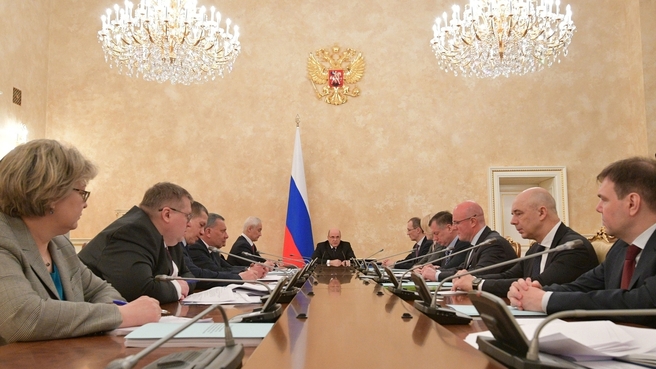The agenda includes measures to prevent the spread of the coronavirus and support the economy, including small and medium-sized businesses.
Mikhail Mishustin’s opening remarks:
First of all, the most important issue today is the measures we are taking to prevent the spread of the coronavirus. Today begins a week off work in Russia in line with the President’s executive order. We are doing everything we can so that people can spend it comfortably at home, in self-isolation, and so that irresponsible people cannot spread this dangerous virus and infect others. Now our main task is to be proactive and minimise the virus’s spread.
Shopping malls and entertainment centres have already shut down. Only shops that sell food and essential goods are still open, and cafes and restaurants only offer takeaway or delivery. The list of these goods has already been approved. The punishment for violating the quarantine has also been stiffened. The Government has approved the necessary amendments to the Russian Administrative Code.
In addition, starting on 30 March, a government directive introduces temporary restrictions on all movement across the Russian state border, including the land border with Belarus.
We are monitoring the spread of the coronavirus in real time. Let me emphasise that the decisions made by the President and the Government are completely justified, in order to protect people as much as possible and allow our healthcare system to treat those who are ill. We already see certain results. The main thing now is to keep up and intensify our work.
Yesterday the executive orders of the Moscow Mayor and the Moscow Region Governor significantly expanded the high-alert regime. The steps taken there logically continue the policy of the President and the Government in countering the coronavirus.
Above all, these are new measures on the need to stay home. People of all ages must self-isolate, except in cases when emergency medical care is needed or when people have to go grocery shopping, go to work if it has not been suspended by these instructions, and for other essential reasons. This will allow us to protect ourselves and our families in the current situation. I am asking the heads of the Russian regions to take into account their colleagues’ experience and work on possible similar measures in their regions.
We will discuss this in detail at the meeting of the Coordination Council Presidium.
Let us address other issues now.
I will begin with support for small and medium-sized enterprises. This is a difficult time for SMEs. We discussed measures to support them at the meeting of the Government Commission on the Development of Small and Medium-Sized Businesses on Friday.
What are we talking about specifically? We will improve access to preferential loans and provide interest-free loans for businesspeople, primarily for paying employees. Such loans must become available to them this week, as we have agreed.
VEB.RF State Development Corporation will provide guarantees of up to 100 billion roubles on payroll loans that small businesses can take out from systemically important banks and the specialised MSP Bank. In the next few days, Sberbank and VTB will get guarantees from VEB.RF on similar loans of up to 20 billion roubles each.
In addition, we have already offered small and medium-sized enterprises such steps as a six-month grace period for all taxes, other than VAT. Insurance payments for micro businesses have been postponed. We have deferred government property lease payments. We will establish a moratorium on charging penalties and bankruptcy procedures.
We also agreed on Friday to offer a number of other benefits for small and medium-sized businesses.
In particular, all payments for servicing existing loans will be delayed by six months for small companies operating in the affected sectors. Moreover, a third of such payments will be assumed by the state through subsidies. And another third – by the banks (for credit portfolios of up to half a trillion roubles).
Starting in July 2020, we will expand the special tax regime for the self-employed to the entire country. However, Russian regions will be able to take their own decision on adopting it.
In general, we resolve all issues of supporting small and medium-sized businesses on a daily basis in an emergency management regime.
A couple of words about the measures that would help cushion the effects of the coronavirus spread for the economy as a whole. The Government will provide primary targeted support to the most affected industries – both as part of the anti-crisis plan and through the measures which we developed in support of small and medium-sized businesses. We will provide assistance to the transport industry: I mean auto and air transport, and the operation of the airports. Specifically, a directive has been signed to allot 1.5 billion roubles to compensate for the expenses of the air carriers which are evacuating people from the countries where the spread of the coronavirus is developing in a worst-case scenario.
We are working on support measures for entities in culture, recreation, physical training and sports. The situation is the same in tourism, the hospitality industry and for those who are engaged in catering. The list also includes extracurricular education centres, non-government educational institutions and the entire personal services industry, such as dry cleaners, barber shops and hair salons, repair shops and other businesses.
Another important aspect of our work is monitoring the financial and economic condition of systemically significant organisations. I have signed an executive order whereby the Ministry of Industry and Trade and other ministries should monitor their condition, and it is very important to take due account of their risks in each sector and respond in a timely manner.
Let’s get down to business.













